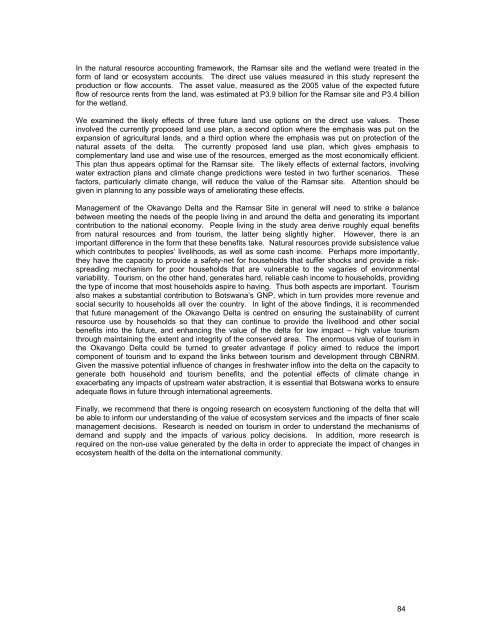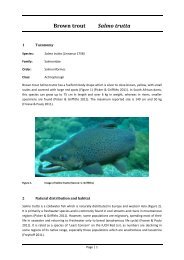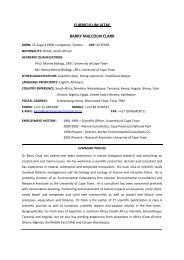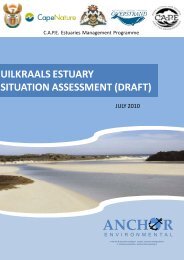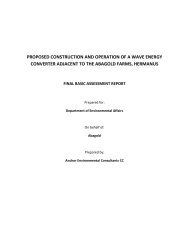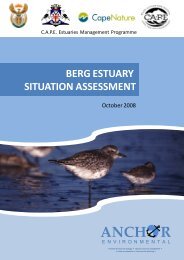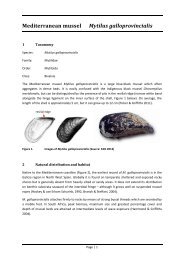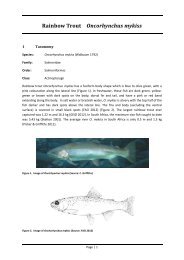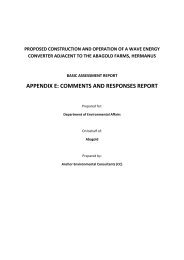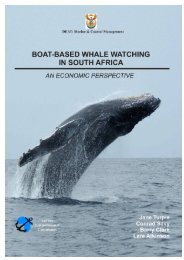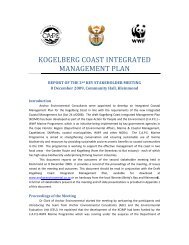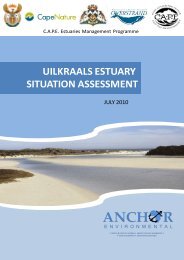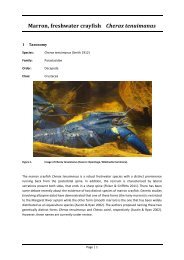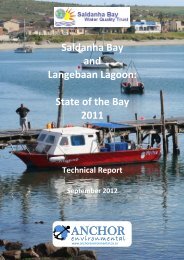Download PDF - Anchor Environmental
Download PDF - Anchor Environmental
Download PDF - Anchor Environmental
Create successful ePaper yourself
Turn your PDF publications into a flip-book with our unique Google optimized e-Paper software.
In the natural resource accounting framework, the Ramsar site and the wetland were treated in the<br />
form of land or ecosystem accounts. The direct use values measured in this study represent the<br />
production or flow accounts. The asset value, measured as the 2005 value of the expected future<br />
flow of resource rents from the land, was estimated at P3.9 billion for the Ramsar site and P3.4 billion<br />
for the wetland.<br />
We examined the likely effects of three future land use options on the direct use values. These<br />
involved the currently proposed land use plan, a second option where the emphasis was put on the<br />
expansion of agricultural lands, and a third option where the emphasis was put on protection of the<br />
natural assets of the delta. The currently proposed land use plan, which gives emphasis to<br />
complementary land use and wise use of the resources, emerged as the most economically efficient.<br />
This plan thus appears optimal for the Ramsar site. The likely effects of external factors, involving<br />
water extraction plans and climate change predictions were tested in two further scenarios. These<br />
factors, particularly climate change, will reduce the value of the Ramsar site. Attention should be<br />
given in planning to any possible ways of ameliorating these effects.<br />
Management of the Okavango Delta and the Ramsar Site in general will need to strike a balance<br />
between meeting the needs of the people living in and around the delta and generating its important<br />
contribution to the national economy. People living in the study area derive roughly equal benefits<br />
from natural resources and from tourism, the latter being slightly higher. However, there is an<br />
important difference in the form that these benefits take. Natural resources provide subsistence value<br />
which contributes to peoples’ livelihoods, as well as some cash income. Perhaps more importantly,<br />
they have the capacity to provide a safety-net for households that suffer shocks and provide a riskspreading<br />
mechanism for poor households that are vulnerable to the vagaries of environmental<br />
variability. Tourism, on the other hand, generates hard, reliable cash income to households, providing<br />
the type of income that most households aspire to having. Thus both aspects are important. Tourism<br />
also makes a substantial contribution to Botswana’s GNP, which in turn provides more revenue and<br />
social security to households all over the country. In light of the above findings, it is recommended<br />
that future management of the Okavango Delta is centred on ensuring the sustainability of current<br />
resource use by households so that they can continue to provide the livelihood and other social<br />
benefits into the future, and enhancing the value of the delta for low impact – high value tourism<br />
through maintaining the extent and integrity of the conserved area. The enormous value of tourism in<br />
the Okavango Delta could be turned to greater advantage if policy aimed to reduce the import<br />
component of tourism and to expand the links between tourism and development through CBNRM.<br />
Given the massive potential influence of changes in freshwater inflow into the delta on the capacity to<br />
generate both household and tourism benefits, and the potential effects of climate change in<br />
exacerbating any impacts of upstream water abstraction, it is essential that Botswana works to ensure<br />
adequate flows in future through international agreements.<br />
Finally, we recommend that there is ongoing research on ecosystem functioning of the delta that will<br />
be able to inform our understanding of the value of ecosystem services and the impacts of finer scale<br />
management decisions. Research is needed on tourism in order to understand the mechanisms of<br />
demand and supply and the impacts of various policy decisions. In addition, more research is<br />
required on the non-use value generated by the delta in order to appreciate the impact of changes in<br />
ecosystem health of the delta on the international community.<br />
84


